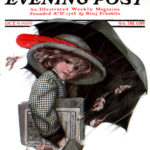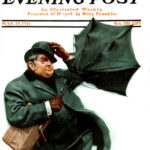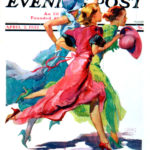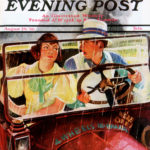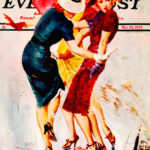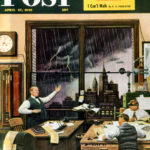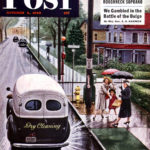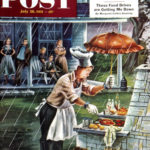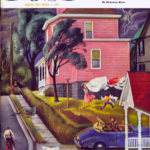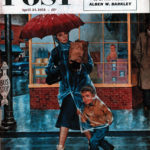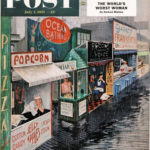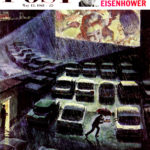Cover Collection: March Winds
Whether it’s warm and balmy or frigid and sleeting, the March winds do blow! Here are a few covers showing that this month definitely comes in like a lion.
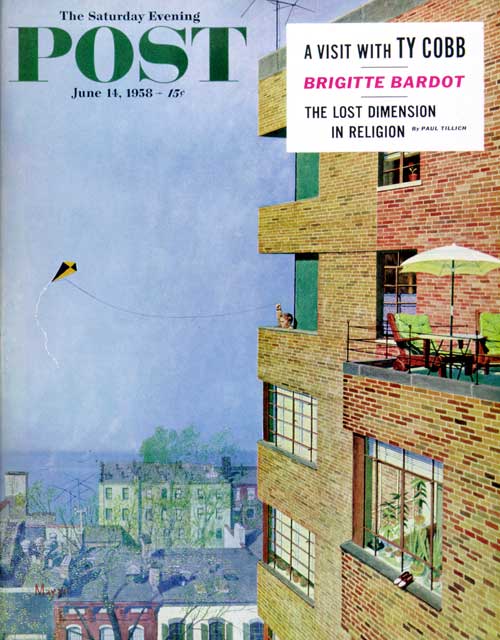
Earl Mayan
June 14, 1958
Post cover artists loved initiative, and who shows that better than the youngster in this 1958 cover? Lacking a green field to run in, the boy flies a kite from his hi-rise balcony. He might envy the kids with room to run, but those kids could envy a heck of a launching pad.
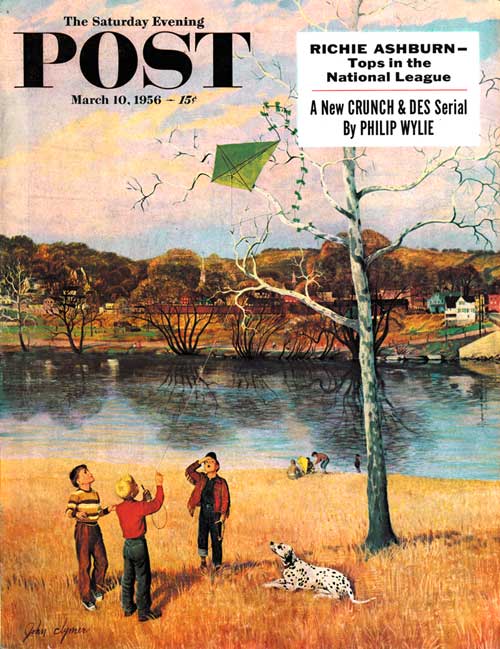
John Clymer
March 10, 1956
Having less luck kiting are the boys from this March 1956 cover. Now this is a pickle. How are those boys going to get the kite out of the tree? Does this remind anyone of Charlie Brown and his “kite-eating tree”?
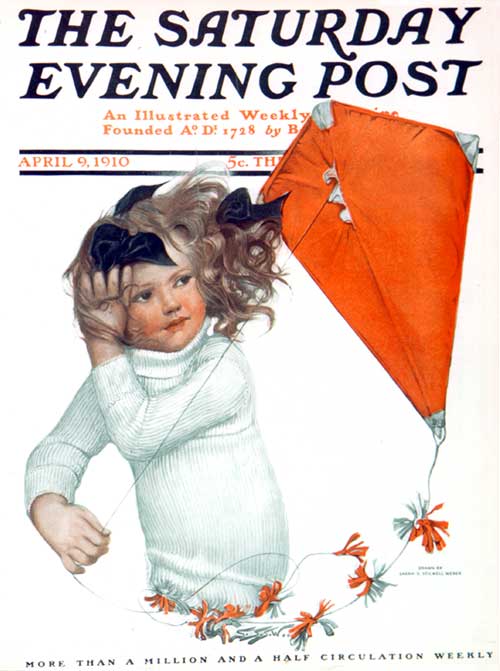
Sarah Stilwell-Weber
April 9, 1910
This pretty lass may be having a bad hair day but a great Kite Day! This is one of the many beautiful Post covers by Sarah Stilwell-Weber that depicted charming children doing everyday things.
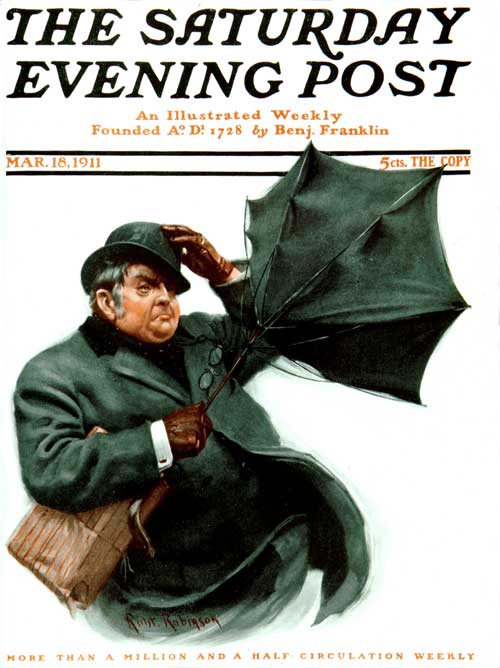
Robert Robinson
March 18, 1911
Holding on to your hat and umbrella at the same time is tricky in high winds. Everyone has had the “inside-out” umbrella experience at one time or another, and this gent from a 1911 cover shows us how frustrating it can be. Do you know what’s really frustrating? That the danged umbrellas still do this!
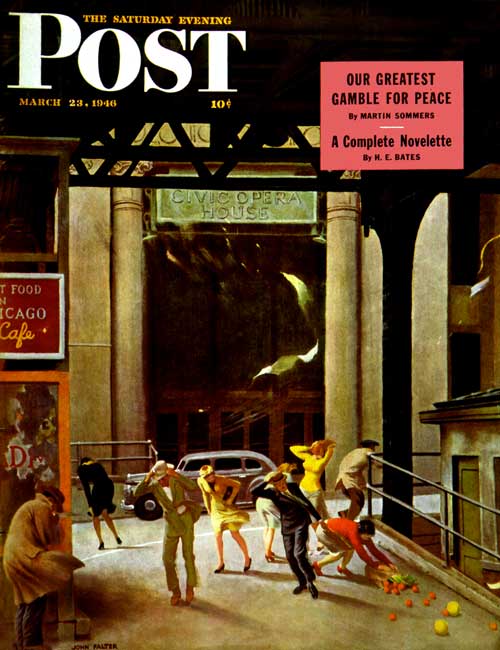
John Falter
March 23, 1946
They don’t call it the “Windy City” for nothing. In this March 1946 cover, the wind is howling down the Chicago River and creating a wind tunnel in front of the Civic Opera House. Hats and skirts are in serious danger, not to mention the poor lady trying to hold on to a bag of groceries. Talk about a bad hair day.
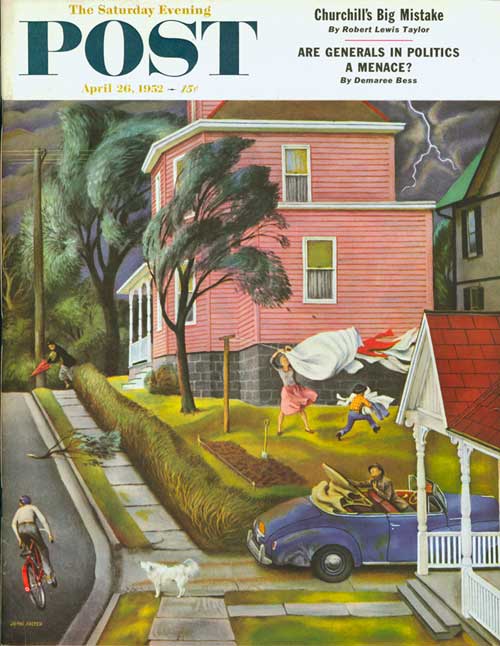
John Falter
April 26, 1952
The March winds blow! Artist John Falter went to a small town in the Midwest for this 1952 cover of big storm brewing. The trees are practically bending over, a woman and child are rushing to get the laundry off the line, and a man is putting up the top on his car (quickly!). The panic even seized the white dog in the foreground, who just rears his head back and howls.
Cover Collection: Tremendous Trains
Whether you’re a die-hard train buff, a transportation geek, or merely a weary commuter, trains have long played a major role in American life. These covers — from as early as 1901 — reflect our love affair with locomotives.
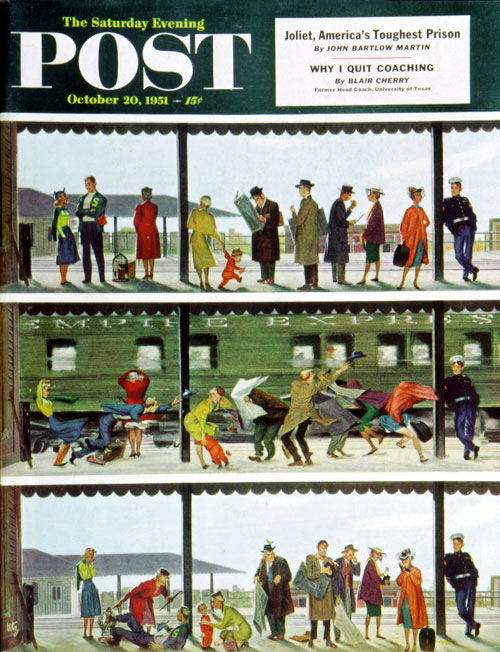
Thornton Utz
October 20, 1951
The top panel of this painting by Thornton Utz shows a well-dressed group of commuters waiting for the Empire Express. Notice the lady in red on the near left with her caged canary. Scene Two: Skirts and hats are flying as the Express roars by. The poor kid on in the letter sweater crashes into the birdcage. The third panel shows a disheveled lot, to say the least. Do you see what happened to the befuddled canary?
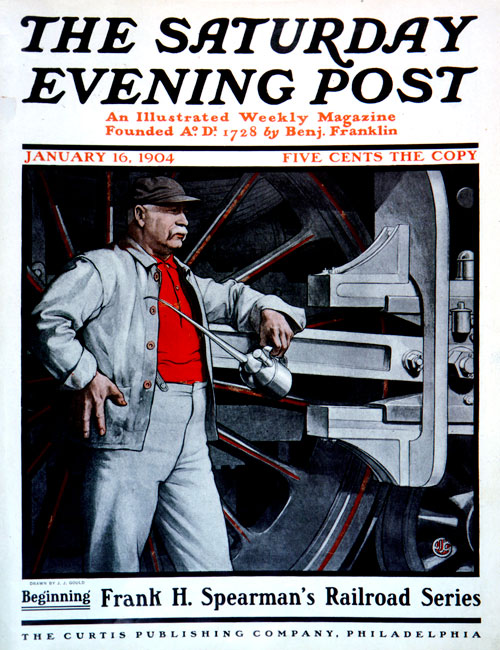
J.J. Gould
January 16, 1904
Train buffs love this turn-of-the-century railroad engineer. Standing by the mighty mechanical monster he conducts, he poses for artist J.J. Gould.
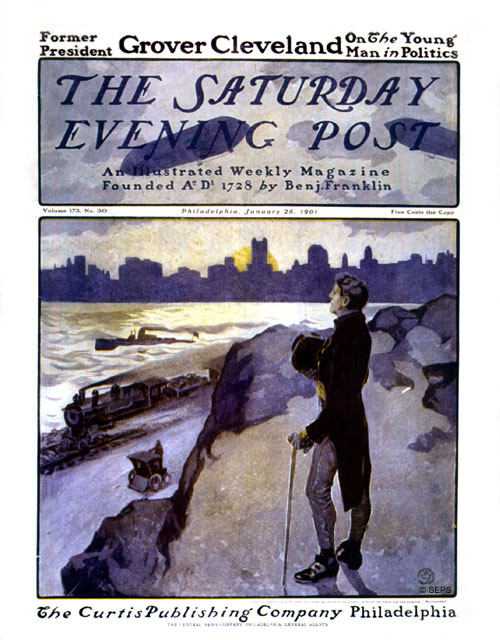
George Gibbs
January 26, 1901
As far back as 1901, trains have graced our covers. Horseless carriages, ships and trains – what will they think of next? A cityscape in the background completes this bow to modernity. The quote below the cover art says: “Bowing respectfully to the past, and rendering justice to the present, we salute the future and true progress. – Montalembert”.
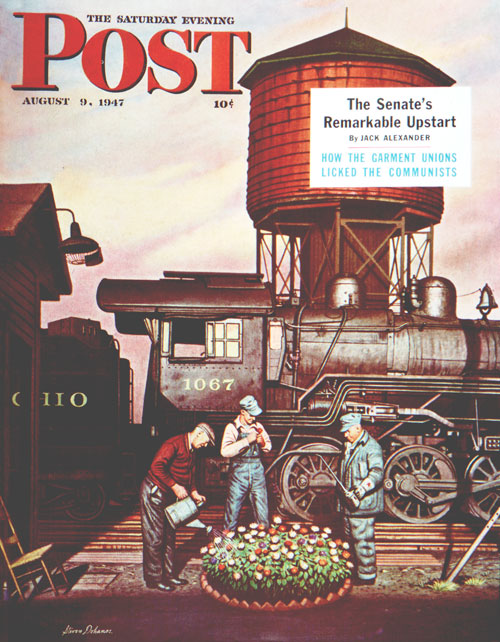
Stevan Dohanos
August 9, 1947
We love this cover by artist Stevan Dohanos from 1947. The editors noted that the artist had actually worked on the Baltimore and Ohio Railroad for a few years. “He checked loads and tracks, beginning a ten-mile hike at 6:30 every morning. He came to think highly of the switchyard men, because in their shacks he could get warm.” Dohanos painted this in his hometown of Lorain, Ohio.
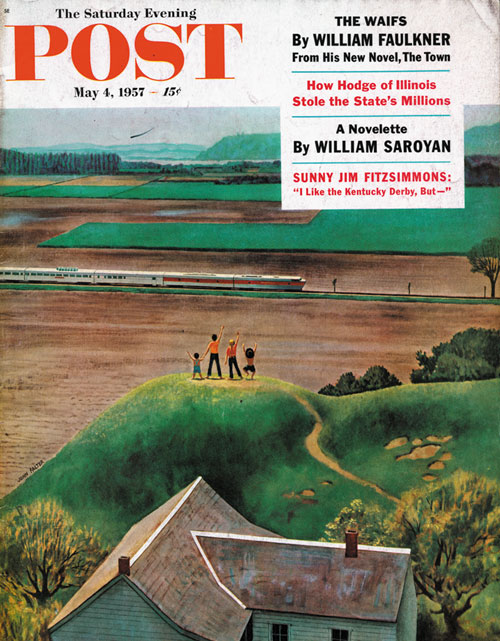
John Falter
May 4, 1957
John Falter, when a child, used to listen to freight trains chugging up a nearby hill and worry about whether they’d make it. Our scene is Missouri, the Missouri River and Kansas beyond. This time we are in Missouri, looking at Kansas in the distance. This time the kids are waving clear across the river to the train. Or maybe they just know somebody in Kansas to wave to.
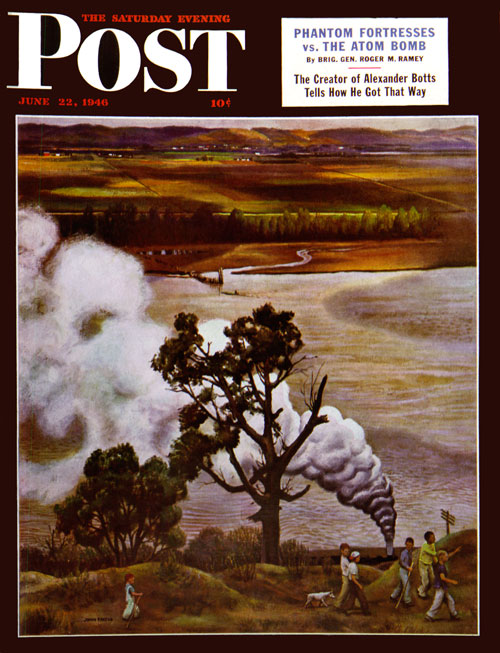
John Falter.
June 22, 1946
Artist John Falter did 129 Post covers, and this is a good example of why. Belching smoke along the mighty Missouri River, this steam engine doesn’t warrant a glance from the boys walking by. They also are probably unaware they are using a route once used by Lewis and Clark. You are in Kansas, looking over into Missouri in this one.
Descriptions by Diana Denny.
Most Popular Cover Collections of 2017
1. Salute to the 50 States
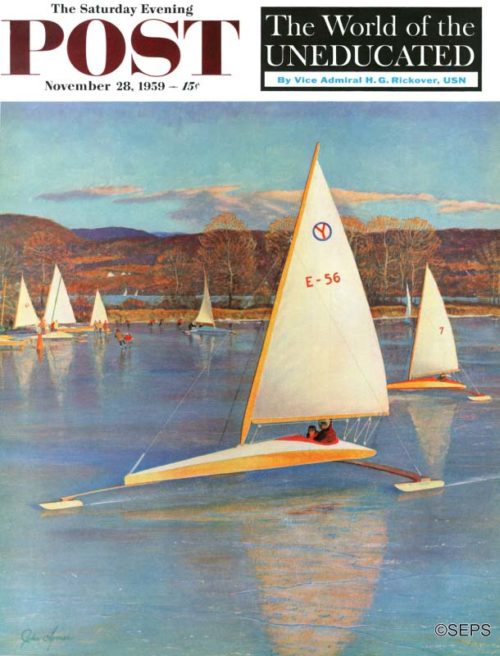
Sailboats
John Clymer
November 28, 1959
From the lighthouses of Maine to the majestic Cascades of Oregon, The Saturday Evening Post has represented every state on its cover. Here are 50 of our favorites. (Apparently they were your favorites, too!)
2. Back to School
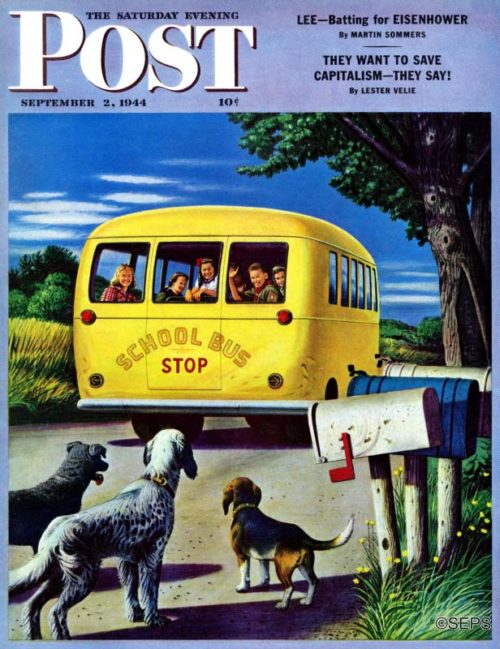
Stevan Dohanos
September 2, 1944
Classrooms may have changed from pencils to PowerPoint, but our magazine has always been there to witness sending our kids back to school.
3. Tee Time
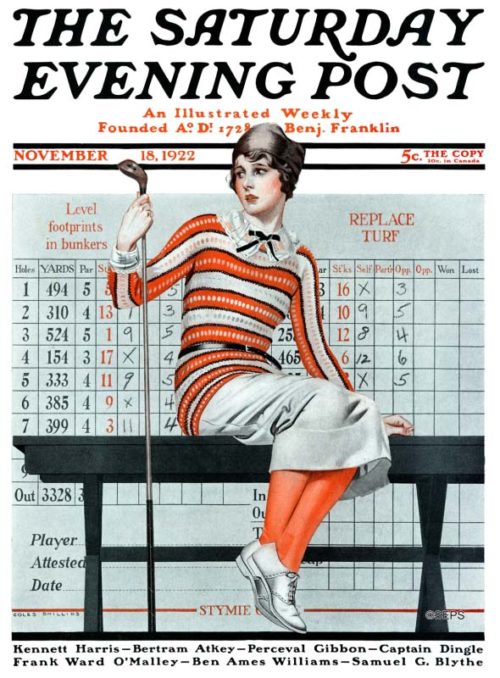
Coles Phillips
November 11, 1922
These covers show that golf is much more than a good walk spoiled. (It s a good day spoiled.)
4. Fall Video Gallery: Vintage Baseball Covers
Artist John Falter brought the fall season to life through his many covers for The Saturday Evening Post. This video highlights some of our favorites.
5. The Best Santas Ever
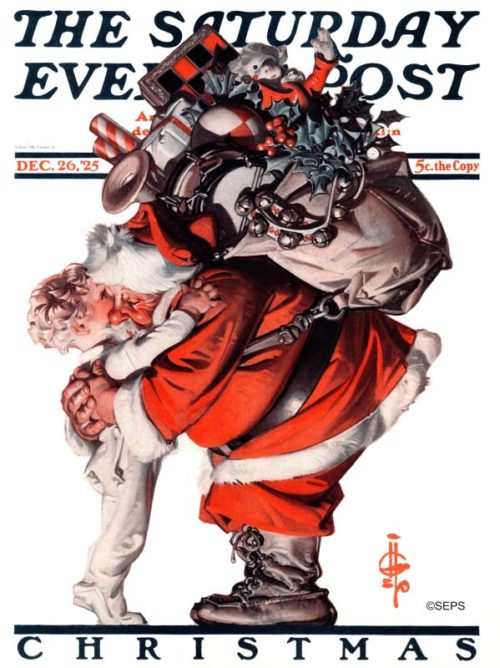
J. C. Leyendecker
December 26, 1925
Over the decades, we’ve featured iconic images of Santa Claus on our December covers. Famed illustrators Norman Rockwell and J.C. Leyendecker created some of the most cherished depictions of St. Nick.
6. Time for Pie
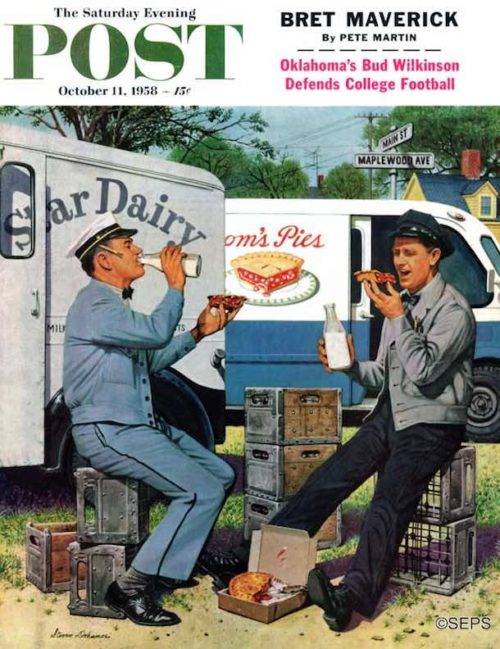
Stevan Dohanos
October 11, 1958
Pie follows closely on the heels of turkey as the quintessential Thanksgiving dish. These pies plus recipes will inspire your pursuit of pastry.
7. Presidents
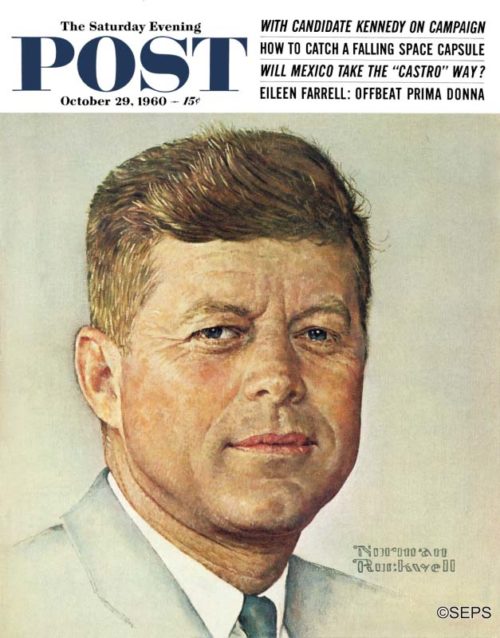
By Norman Rockwell
October 29, 1960
From Grover Cleveland to Richard Nixon, The Saturday Evening Post featured many U.S. presidents on its covers in its nearly 200-year history.
8. Celebrating America
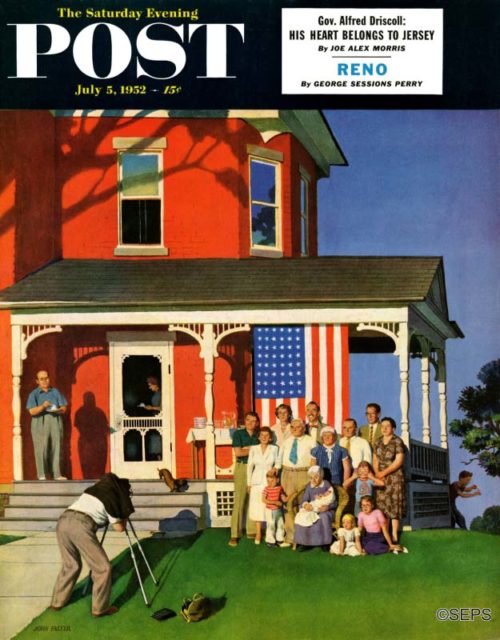
John Falter
July 5, 1952
With fluttering flags and steadfast soliders, the Post has honored the land of the free and the home of the brave.
9. Travel Nightmares
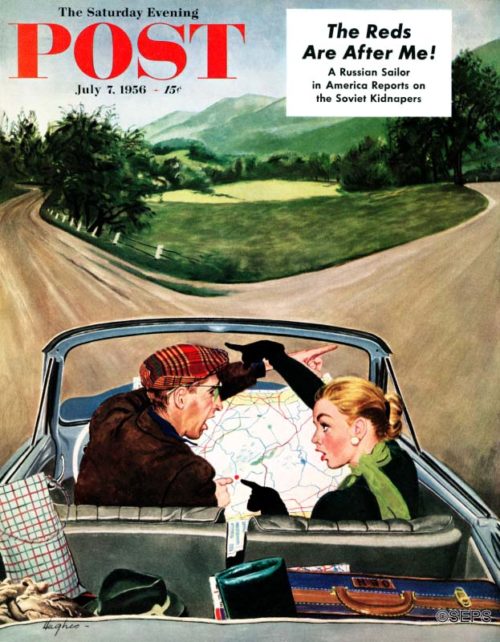
George Hughes
July 7, 1956
These illustrations of jaunts gone wrong might make you re-think that summer road trip.
10. Congrats, Graduates!
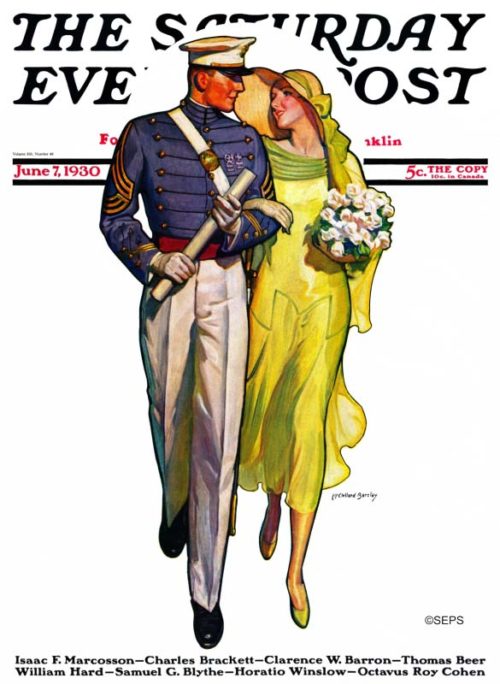
McClelland Barclay
June 7, 1930
This moment of accomplishment has made frequent appearances on our covers, starting more than a hundred years ago.
Fall Video Gallery: John Falter’s Autumn Covers
Artist John Falter brought the fall season to life through his many covers for The Saturday Evening Post. Here are some of our favorites.
See more videos from The Saturday Evening Post at www.saturdayeveningpost.com/video.
Remembering Artist John Falter
“I know that Norman Rockwell, who captures Americana so beautifully, is every American’s favorite artist; mine, however, is John Falter,” writes Ted Wallace. “Mr. Falter lived next door to my family in Atchison, Kansas, where from his attic studio he painted Midwestern scenes.”
There is a reason this particular 1946 Post cover is Mr. Wallace’s favorite; he is in the painting. “I am the little brother tagging along behind my big brother and his friends, just wanting to belong. Mr. Falter had seen the group of neighborhood boys from his studio window and incorporated us into the painting.”
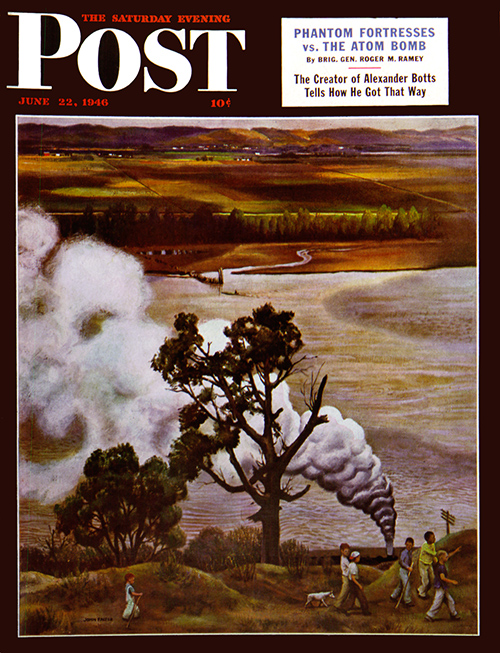
John Falter
June 22, 1946
What Falter was painting was one of the great rivers of America, the mighty Missouri. The viewer is in Kansas, looking across into Missouri. The boys are taking the same route as Lewis and Clark.
I have to say, Mr. Wallace puts it more eloquently: “…a summer scene overlooking the Missouri River and the fertile river bottoms beyond, with a group of rag-tag boys on a quest—searching for fun during the later years of World War II.”
“Time moves on and memories fade,” Wallace notes, “I only remember the names of four of the group—my brother, Bob Wallace (with the stick), and his friends, Jimmy Knight and Jimmy Morehead. The other two have faded into just memories. Of course, our dog Shorty is there with me…bringing up the rear.” Actually, for 65 years ago, that’s pretty darn good!
A steam locomotive always sticks in the minds of little boys. “We were always aware of the locomotives going up and down the tracks. Who could ever forget that mournful sound of the steam whistle fading off into the distance?” He also recalls, “the riverboats pushing barges up and down the river.”
“Those bluffs were our magic carpet as we chased the spirits of Lewis and Clark. Yes, we knew of their route and knew that we had walked in their foot steps. Our imaginations also ran rampant with the knowledge that Jesse James’ gang, Quantril’s raiders, and the Pony Express riders (just a few miles north) also traversed through that area; an area where time and young boys never stood still and life was simpler.”

“Mr. Falter gave my parents a copy of that issue of the magazine, which our mother kept for years until the Missouri claimed all of our memories when the Mighty Mo flooded those fertile river bottoms before my parents could save anything.”
“My brother and I now have a framed copy of that cover, obtained from the Post, that we and our families will treasure forever. Even after 65 years, the scene John Falter captured has not changed all that much; the steam engines are nothing but a memory, but the lives and dreams of those six boys will live on through generations to come.”
Classic Covers: Snow Days
It isn’t just rough this winter! From dodging a snowy ambush to shoveling sidewalks, the white stuff is a challenge as seen The Saturday Evening Post covers as far back at 1912.
Snowy Ambush – John Falter
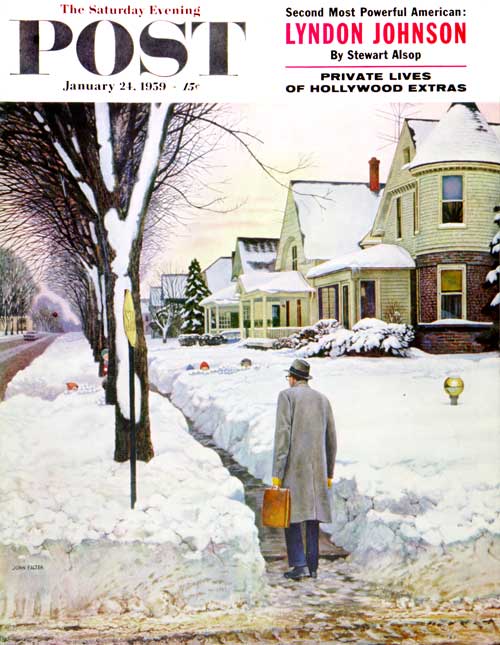
John Falter
January 24, 1959
Having a hard day at the office isn’t bad enough. The man in artist John Falter’s January 1959 cover seems to be entering a sort of demilitarized zone. The troops are entrenched (see the little heads behind the snow banks?) and ready to fire. The stash of snowballs shows they have enough ammo to last awhile. You have to wonder how the man gets out of this one.
Snowball Fight – J.F. Kernan
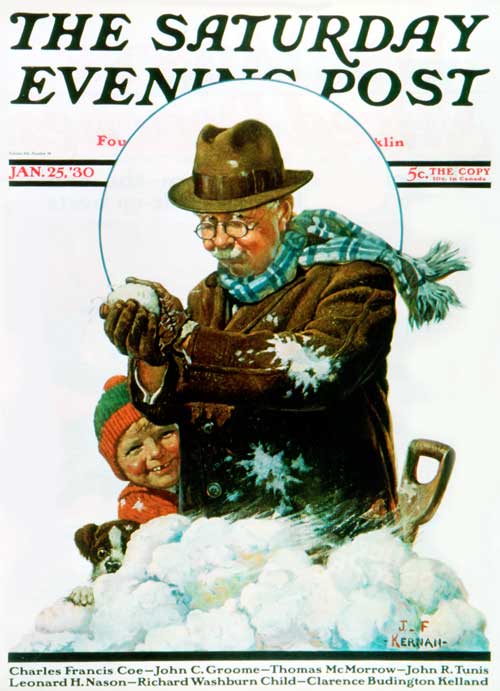
J.F. Kernan
January 25, 1930
Never mind the neighborhood kids – watch out for the old guys! I love the ornery gleam in grandpa’s eyes as he hones in on his target. This cover is from 1930 by artist J.F. Kernan.
Plowed-Over Driveway – Earl Mayen
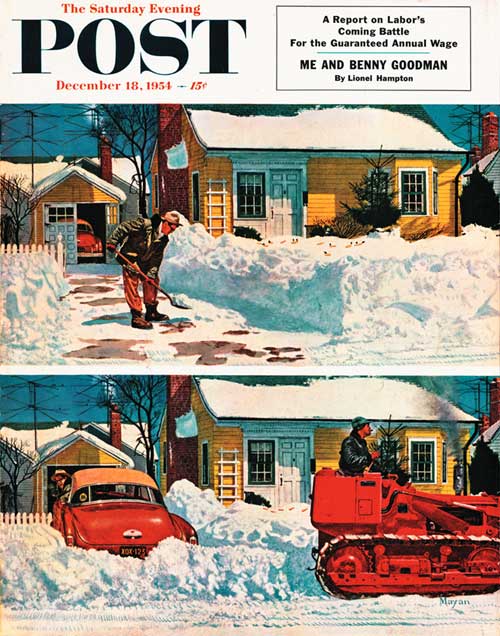
Earl Mayen
December 18, 1954
Okay, stop us if you’ve heard this before: a man arduously shovels his driveway, then along comes a snowplow… On artist Earl Mayan’s December 1954 cover, just such a scene ensues as the motorist attempts to back out, and is he steamed! If only some of that steam could melt snow…
Boy Shoveling Snow – Charles A MacLellen
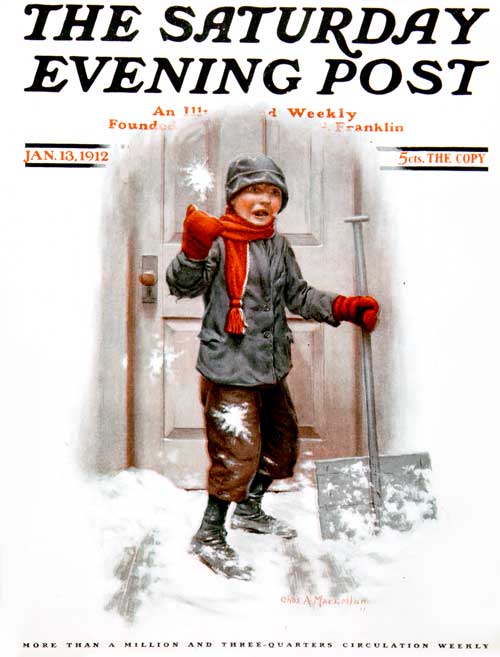
Charles A Maclellen
January 25, 1930
It’s hard enough to shovel a sidewalk without dodging snowballs. In this cover of January 1912, the boy is probably debating dropping the shovel and firing back. Give a hard-working boy a break!
Snow Shoveler Ringing Doorbell – Eugene Iverd

Eugene Iverd
January 3, 1931
An enterprising young man (and dog) is ringing doorbells on artist Eugene Iverd’s January 1931 cover. The snowfall seems to have brought about a budding business enterprise. If you know someone looking for prints of boys doing all their boy things, look up artist Eugene Iverd at curtispublishing.com – great covers!
Shoveling Floral Shop Sidewalk –John Falter
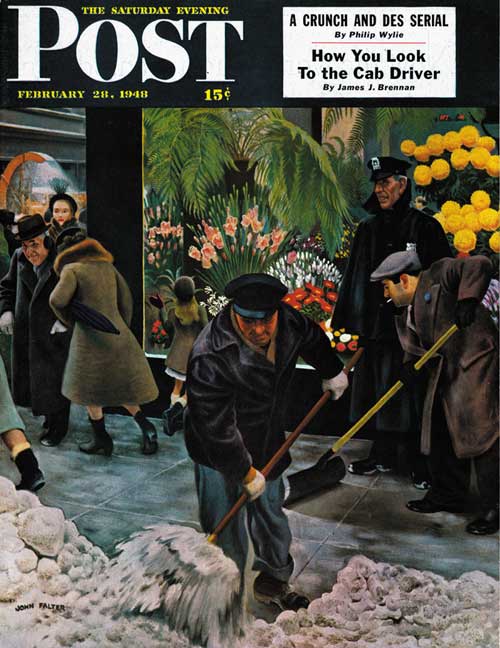
John Falter
February 28, 1948
The weather outside is frightful, but inside the flower shop it is spring! Artist John Falter did a beautiful painting of contrasts for the February 28, 1948 cover. Inside are the pinks, yellows and reds of blossoms; outside is dirty old New York snow. The poor policeman on the beat looks miserably frozen, but maybe the shop window is to give us hope. The snow can’t last forever, right?
Classic Covers: Rain, Rain, Go Away!
American poet and educator Henry Wadsworth Longfellow perhaps said it best: “Into each life some rain must fall, some days must be dark and dreary.” The rainy days on our Post covers show the dark and dreary, the frustrations along with the humor that accompanies a downpour. No fair weather friends, our cover artists!
Dating Rule No. 1: If trying to impress a girl with your fancy convertible, be sure a downpour isn’t in the works. In Albert W. Hampson’s 1936 cover, the young lady is clearly not impressed—whatever the make or model—when the rain comes. The expression on the young man’s face clearly says, “I have so blown it.” Well, at least she wasn’t wearing a lovely hat to ruin, such as the pretty lady in Douglass Crockwell’s April 8, 1939, cover. But she’s a clever lass—she’s pulling down the handy Post cover for protection!
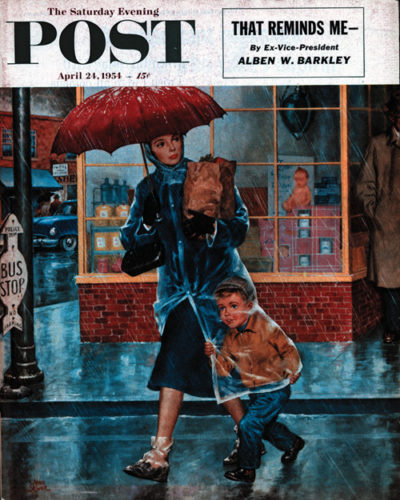
Boy Walking Under Mother's Raincoat
April 24, 1954
Also showing good ol’ American ingenuity is the young boy on Amos Sewell’s April 24, 1954, cover. Since mom’s raincoat is clear plastic, he figured out a way to walk in the rain, see where he’s going, and keep himself quite dry—well, at least the top half.
Downpours help us discover speed we didn’t know we had. In the 1950s, you not only worried about getting the top up on your convertible when a Midwest storm blew in, you had to scurry to get the laundry off the line. Artist John Falter remembered the “hair-curling lightning and thunder” in that part of the country from his boyhood, and his April 26, 1952, cover shows that Mother Nature clearly plans to take no prisoners. Also dodging raindrops are three charming ladies on John LaGatta’s colorful April 2, 1932, cover.
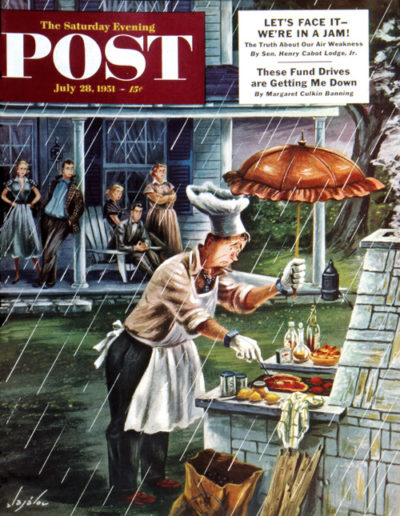
Constantin Alajalov
July 2, 1955
Let’s visit the local drive-in. Or is it the local float-in? On John Falter’s May 13, 1961, cover, our real-life hero protects burgers and shakes from the pouring rain as he scurries through the puddles to nourish his hungry troops. Rain or shine, the show must go on! Much more difficult than negotiating puddles to feed the family is cooking food in the rain, as seen in Constantin Alajalov’s July 1951 cover. You would think one of the slackers on the porch would at least hold the umbrella for the poor cook.
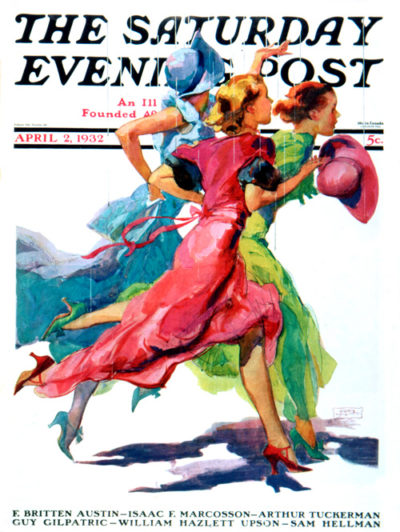
Ladies Running From Rain
April 2, 1932
Sarah Stilwell-Weber, who delighted Post readers in the early 1900s with her beautiful paintings of children, shows a girl walking in the rain, balancing schoolbooks and an umbrella on the October 9, 1909, cover. Having less luck with his umbrella is the gentleman in Robert Robinson’s March 18, 1911, cover. Holding on to your hat and an inside-out umbrella at the same time takes dexterity.
Another trio of beautifully dressed LaGatta ladies are getting splashed by a passing car in the May 20, 1939, cover. But leave it to a Post cover artist to find irony, as in one of our favorite rainy-day covers from October 2, 1948. Three pedestrians are being splashed by a passing truck. But not just any truck, dear friends, a delivery vehicle for the local dry cleaners.
On the bright side, our cover research found someone happy about the storms! Stevan Dohanos’ April 1946 cover shows gentlemen from the New York weather bureau delightedly noting the lightning storm outside. While there’s no fun getting wet, there’s a certain pleasure in getting it right!
Gallery
Girl with Schoolbooks in Rain
October 9, 1909
Man with Inside-out Umbrella
March 18, 1911
Ladies Running From Rain
April 2, 1932
Couple in Convertible
August 29, 1936
Lady in Hat in Rain
April 8, 1939
Ladies Getting Splashed
May 20, 1939
Weatherman Was Right
April 27, 1946
Splashed by Dry Cleaning Truck
October 2, 1948
Rainy Barbeque
July 2, 1955
Storm Coming
April 26, 1952
Boy Walking Under Mother’s Raincoat
April 24, 1954
Rain on the Boardwalk
July 2, 1955
Rainy Drive-In
May 31, 1961
